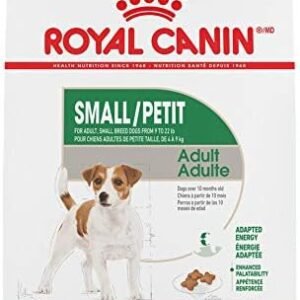Introduction
Are you looking to learn more about the charming Yorkshire Terrier dog breed? Look no further! In this comprehensive guide, we will delve into the world of Yorkshire Terriers, exploring their unique characteristics, care requirements, and what makes them such beloved companions for countless dog enthusiasts.
Yorkshire Terriers, often affectionately called “Yorkies,” are one of the most popular small dog breeds globally, known for their feisty personalities and elegant appearance. These little canines have captured the hearts of many, and this guide aims to provide you with all the essential information you need to know about them.
Why Choose This Guide?
While there is no shortage of information available on the internet about Yorkshire Terriers, it’s essential to have a reliable and up-to-date source that offers a complete overview of the breed. This guide will be your one-stop resource, covering everything from their physical characteristics to their temperament, care needs, and much more.
So, let’s begin our journey into the delightful world of Yorkshire Terriers by first understanding their basic characteristics through a handy table:
Yorkshire Terrier Breed Overview
| Field | Information |
|---|---|
| Height | 7 to 8 inches (17.8 to 20.3 cm) |
| Weight | 4 to 7 pounds |
| Life Span | 12 to 15 years |
| Good with | Families, singles, seniors |
| Temperament | Spirited, affectionate |
| Intelligence | High |
| Shedding Amount | Low |
| Grooming | High maintenance |
| Exercise Needs | Moderate |
| Energy Level | Energetic |
| Barking Level | High |
| Drool Amount | Minimal |
| Coat Length/Texture | Long, silky |
| Colors | Steel blue and tan |
| Patterns | Tan markings |
Please note that the Yorkshire Terrier is known for its petite size, but exact measurements can vary. Their lifespan is typically around 12 to 15 years, making them long-term companions for those who welcome them into their homes.
In the sections that follow, we will explore each of these characteristics in greater detail, providing insights into what makes Yorkshire Terriers unique and how to best care for them. So, let’s dive in!
Table of Contents
Breed History and Origin
The Yorkshire Terrier, often abbreviated as “Yorkie,” may be small in size, but its history is vast and intriguing. In this section, we will take a journey back in time to explore the roots of this charming breed, the notable traits that define it, and the relevance of its origin in shaping the Yorkshire Terrier we know today.
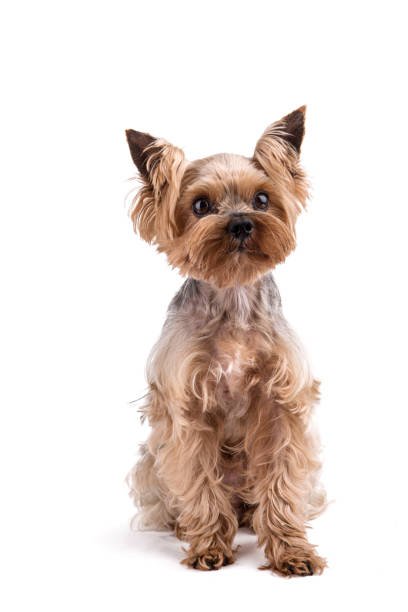
Exploring Their Roots
The Yorkshire Terrier’s history dates back to the early 19th century in England. This breed was developed in the counties of Yorkshire and Lancashire, particularly for the purpose of catching rats and mice in clothing mills and coal mines during the Industrial Revolution.
Breeds That Played a Role:
The Yorkshire Terrier’s ancestry is a blend of various terrier breeds, including the Waterside Terrier, Clydesdale Terrier, and Paisley Terrier. The breed’s development also involved some influence from the Skye Terrier and Maltese. This mix of terrier and toy breeds contributed to the Yorkie’s unique characteristics.
Notable Traits:
What sets the Yorkshire Terrier apart from other breeds is its distinctive appearance. These dogs are known for their silky, long, and straight coats that come in a combination of blue and tan colors. Their heads are small and flat, with bright, expressive eyes that convey intelligence and curiosity. Yorkies also have small, V-shaped ears that stand erect.
Another notable trait is their size. Yorkshire Terriers are considered one of the tiniest dog breeds, typically weighing between 4 to 7 pounds when fully grown. Their petite stature and charming looks have earned them a place in the hearts of dog lovers worldwide.
Relevance of Origin
Understanding the origin of the Yorkshire Terrier is crucial in appreciating why this breed possesses certain characteristics and behaviors today.
1. Tenacity and Courage:
Yorkshire Terriers were originally bred for hunting vermin in harsh industrial environments. This background instilled in them a fearless and determined nature. Even though they are small, Yorkies are known for their courage and tenacity when it comes to protecting their families.
2. Intelligence and Trainability:
Due to their terrier heritage, Yorkshire Terriers are highly intelligent dogs. They learn quickly and can be trained to perform various tricks and commands. This intelligence makes them excellent companions for obedience training and agility activities.
3. Coat Care and Grooming:
The Yorkie’s long and silky coat was initially developed to protect them from the cold, damp conditions of the mines. While these conditions have changed over time, their luxurious coat remains a defining feature. However, it also means that grooming is a significant part of caring for a Yorkshire Terrier. Regular brushing, bathing, and trimming are essential to keep their coat in top condition.
4. Social and Affectionate:
Yorkshire Terriers were bred to be working dogs, but they were also meant to be companions to the workers. This history of close human interaction has made them naturally social and affectionate dogs. They thrive on human companionship and are known for forming strong bonds with their owners.
In conclusion, the Yorkshire Terrier’s history and origin provide valuable insights into the breed’s unique traits and characteristics. Their tenacity, intelligence, grooming needs, and affectionate nature are all influenced by their historical role as both rat hunters and beloved companions. By understanding their roots, we can better appreciate and care for these delightful little dogs.
In the next section, we will delve deeper into their temperament and personality, shedding light on what makes them such lovable companions.
Understanding the Yorkshire Terrier Breed’s Traits
Now that we’ve explored the history and origin of the Yorkshire Terrier, it’s time to dive deeper into their unique traits. In this section, we’ll discuss the physical characteristics of this breed, their temperament, suitability as family pets, their compatibility with children and other pets, their environmental needs, and the importance of training and socialization.
Physical Characteristics
Size: Yorkshire Terriers are a small dog breed, known for their diminutive stature. On average, they stand about 7 to 8 inches tall at the shoulder and typically weigh between 4 to 7 pounds. Their compact size makes them perfect for apartment living and travel companions.
Coat Type: One of the most distinctive features of Yorkshire Terriers is their luxurious, silky coat. It’s fine, straight, and hangs down evenly on each side of their body. The coat is a combination of blue (a steel-blue color) on the body and a rich tan color on the head and legs.
Distinguishing Features: Yorkshire Terriers have a small, flat head with a black nose and bright, expressive eyes. Their ears are V-shaped and stand erect. They have a docked tail that is traditionally left with a few inches of length and carried slightly higher than the back.
Temperament Overview
Yorkshire Terriers may be small, but they have personalities that are larger than life. Here’s an overview of their temperament:
1. Spirited: Yorkies are known for their spirited and lively nature. They have a lot of energy packed into their small frames, which can make them quite playful and even a bit sassy at times.
2. Affectionate: Despite their spunky nature, Yorkshire Terriers are also incredibly affectionate. They form strong bonds with their owners and thrive on love and attention.
3. Intelligence: These dogs are highly intelligent and quick learners. This intelligence can be a blessing in training but also requires mental stimulation to keep them happy.
4. Alertness: Yorkies are vigilant and make excellent watchdogs. They have a tendency to bark when they sense something amiss, which can be a valuable trait for home security.
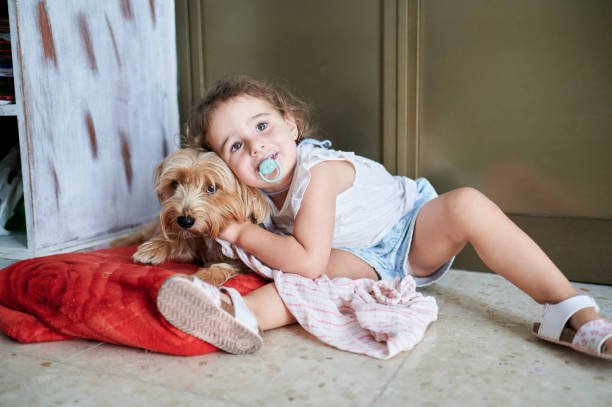
Suitability as Family Pets:
Yorkshire Terriers are well-suited for families, singles, and seniors alike. Their small size makes them adaptable to various living situations, from apartments to houses with yards. However, due to their delicate size, they may not be the best choice for families with very young children who may not understand how to handle a small dog gently.
Compatibility with Children:
Yorkshire Terriers can get along well with older children who can handle them with care and respect their small size. They tend to have a strong bond with their human family members and can be affectionate playmates.
Compatibility with Other Pets:
With proper socialization, Yorkies can also get along with other pets in the household, including cats and dogs. Early exposure to different animals and positive interactions can help ensure a harmonious multi-pet environment.
Environmental Needs
Space: Yorkshire Terriers do well in smaller living spaces like apartments because of their small size. However, they still need daily exercise and playtime to stay happy and healthy.
Temperature: Due to their fine coat, Yorkshire Terriers can be sensitive to extreme temperatures. They are more comfortable in temperate climates and may need extra protection in very cold or hot weather.
Home Environment: These dogs thrive in a loving and nurturing home environment. They are social creatures and should not be left alone for long periods. They are happiest when they can be close to their human companions.
Training and Socialization
Trainability: Yorkshire Terriers are highly trainable and excel in obedience training. However, they can have a stubborn streak, so consistent and patient training methods work best.
Socialization: Proper socialization is crucial for Yorkies. Exposing them to various people, animals, and environments from a young age helps prevent fearfulness and aggression. Socialization also encourages their friendly and adaptable nature.
In conclusion, Yorkshire Terriers are a delightful breed known for their small size, stunning coat, spirited temperament, and affectionate nature. They are well-suited to various living situations and can make excellent family pets when given the right care and attention. By understanding their traits and meeting their needs, you can enjoy the companionship of a loving and loyal Yorkshire Terrier.
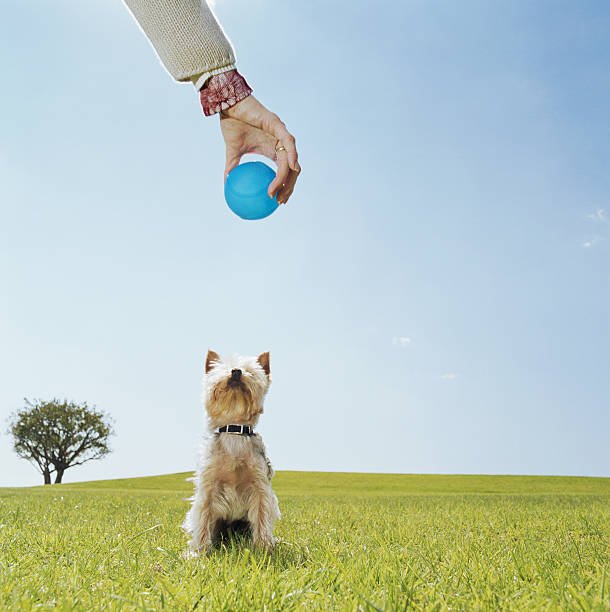
In the next section, we will explore their specific care requirements, including grooming, exercise, and dietary needs.
Health Considerations and Care
Taking care of your Yorkshire Terrier’s health is paramount to ensure they live a happy and fulfilling life. In this section, we will discuss common health issues that the breed may be prone to, provide insights into their average lifespan, offer guidance on diet and nutrition, explain the importance of exercise and activity, and delve into the grooming and maintenance practices required to keep your Yorkshire Terrier in top condition.
Common Health Issues
While Yorkshire Terriers are generally a healthy breed, like all dogs, they can be prone to certain health issues. It’s essential to be aware of these potential problems and take preventive measures. Common health concerns for Yorkshire Terriers include:
1. Dental Problems: Yorkies are susceptible to dental issues, including periodontal disease. Regular tooth brushing and dental check-ups are crucial for maintaining their oral health.
2. Luxating Patella: This condition involves the dislocation of the kneecap and can be common in small breeds like Yorkshire Terriers. It may require surgical intervention in severe cases.
3. Hypoglycemia: Due to their small size and high metabolism, Yorkies can experience low blood sugar levels. Feeding them small, frequent meals can help prevent this issue.
4. Tracheal Collapse: Yorkies can have a weakened trachea, making them prone to coughing or gagging. Using a harness instead of a collar for walks can reduce pressure on the throat.
5. Portosystemic Shunt: This is a congenital condition where blood flow bypasses the liver, leading to poor toxin removal. Early detection and treatment are essential.
6. Eye Problems: Yorkshire Terriers can be susceptible to eye conditions like cataracts and retinal dysplasia. Regular eye examinations are necessary.
7. Legg-Calvé-Perthes Disease: This is a condition where the hip joint deteriorates, leading to pain and lameness. Surgery may be required for treatment.
8. Allergies: Some Yorkies may develop allergies, including food allergies or skin allergies. Identifying and managing the allergen is key.
Lifespan and Longevity
The average lifespan of a Yorkshire Terrier is around 12 to 15 years. With proper care, some Yorkies have been known to live even longer. To promote a longer and healthier life for your Yorkshire Terrier, consider the following tips:
1. Regular Veterinary Check-ups: Schedule regular visits to the veterinarian to catch and address any health issues early.
2. Balanced Diet: Ensure your Yorkie receives a well-balanced diet with high-quality dog food appropriate for their age, size, and activity level.
3. Portion Control: Avoid overfeeding, as Yorkies are prone to obesity. Follow recommended feeding guidelines and avoid excessive treats.
4. Exercise and Mental Stimulation: Provide daily exercise and mental stimulation through short walks, playtime, and puzzle toys.
5. Weight Management: Maintain a healthy weight for your Yorkie to reduce the risk of joint problems and other health issues.
6. Dental Care: Regularly brush your Yorkie’s teeth and consider dental treats or toys to promote good oral hygiene.
7. Preventative Measures: Keep up with vaccinations, flea and tick prevention, and heartworm medication as recommended by your vet.
Diet and Nutrition
Proper nutrition is vital for the well-being of your Yorkshire Terrier. Here are some dietary considerations:
1. High-Quality Dog Food: Choose dog food that lists a quality protein source as the first ingredient and meets AAFCO (Association of American Feed Control Officials) guidelines.
2. Small Portions: Due to their small size, Yorkies have small stomachs. Feed them in small, frequent meals to prevent overeating.
3. Avoid Human Food: Refrain from feeding your Yorkie human food, especially items that can be toxic to dogs like chocolate, grapes, and onions.
4. Fresh Water: Ensure your Yorkie has access to clean, fresh water at all times.
5. Special Dietary Needs: Some Yorkies may have specific dietary requirements or allergies. Consult your vet if you suspect food-related issues.
Exercise and Activity
Despite their small size, Yorkshire Terriers are active dogs that require daily exercise and mental stimulation. Here’s how to keep them active and happy:
1. Daily Walks: Take your Yorkie on short, daily walks to expend their energy and provide mental stimulation.
2. Playtime: Engage in interactive play sessions with toys, puzzles, and games to keep their minds sharp.
3. Socialization: Allow your Yorkie to interact with other dogs and people to ensure they develop good social skills.
4. Indoor Activities: On rainy or extremely hot days, provide indoor activities like hide-and-seek or fetch in a safe, indoor space.
Grooming and Maintenance
Yorkshire Terriers have a stunning coat that requires regular grooming to stay healthy and beautiful. Here’s how to care for their coat and overall grooming needs:
1. Brushing: Brush your Yorkie’s coat daily to prevent matting and tangles. Use a soft brush or comb designed for long-haired breeds.
2. Bathing: Bathe your Yorkie every 3 to 4 weeks or as needed, using a gentle dog shampoo. Be sure to thoroughly dry their coat after a bath.
3. Coat Trimming: Regularly trim their coat to maintain its length and prevent it from dragging on the ground.
4. Ear Cleaning: Clean their ears as needed to prevent infections. Use a vet-recommended ear cleaner.
5. Dental Care: Brush your Yorkie’s teeth regularly to maintain good oral hygiene.
6. Eye Cleaning: Keep their eye area clean to prevent tear staining. Use a damp cloth to gently wipe away any discharge.
7. Shedding: Yorkies are considered a low-shedding breed, but their fine hairs may not be noticeable when they do shed. Regular brushing helps manage loose hair.
In summary, caring for your Yorkshire Terrier’s health involves proactive measures such as regular vet visits, a balanced diet, exercise, and meticulous grooming. By addressing their specific needs, you can ensure your beloved Yorkie lives a long, happy, and healthy life.
In the next section, we will explore the practical aspects of bringing a Yorkshire Terrier into your home, including adoption considerations, training tips, and common misconceptions about the breed.
Choosing and Adopting a Yorkshire Terrier Dog Breed
Bringing a Yorkshire Terrier into your life can be a rewarding experience, but it’s essential to make an informed decision. In this section, we will discuss the reasons for adopting a Yorkshire Terrier, offer tips on research and preparation, explain the adoption process, and touch on breeding and ethical considerations.
Reasons for Adoption
Adopting a Yorkshire Terrier can be a life-changing experience, not only for you but also for the dog you bring into your home. Here are some compelling reasons to consider adopting a Yorkshire Terrier:
1. Giving a Second Chance: Adopting a Yorkshire Terrier from a rescue or shelter provides them with a second chance at a loving and caring home. Many rescue dogs have faced difficult circumstances and are in need of a stable and nurturing environment.
2. Saving a Life: When you adopt, you are potentially saving a dog’s life. Shelters often struggle with overcrowding and limited resources, and your decision to adopt can make a significant difference.
3. Breed-Specific Knowledge: If you have done your research and are well-prepared for the specific needs and characteristics of Yorkshire Terriers, you can provide them with a tailored and loving home.
4. Companionship: Yorkshire Terriers are known for their affectionate and loyal nature. Adopting one can bring joy, companionship, and a strong bond to your life.
Research and Preparation
Before adopting a Yorkshire Terrier, it’s crucial to do your homework and make the necessary preparations:
1. Understand the Breed: Research the Yorkshire Terrier breed thoroughly. Learn about their temperament, exercise needs, grooming requirements, and potential health issues. Ensure that their characteristics align with your lifestyle and preferences.
2. Financial Responsibility: Owning a dog comes with financial responsibilities. Be prepared for expenses like food, grooming, regular veterinary care, and unexpected medical costs.
3. Space and Environment: Consider whether your living space is suitable for a Yorkshire Terrier. While they are small dogs, they still need sufficient room to move and play. Ensure your home is safe and secure for a new pet.
4. Time Commitment: Dogs, including Yorkshire Terriers, require time and attention. Ensure you have enough time to dedicate to training, exercise, and socialization.
5. Finding a Reputable Source: When adopting a Yorkshire Terrier, it’s essential to choose a reputable source. Look for local animal shelters, rescue organizations, or breed-specific rescues with a track record of ethical practices and care for their animals.
Adoption Process
The adoption process for a Yorkshire Terrier typically involves several steps:
1. Application: Start by filling out an adoption application with the rescue organization or shelter. They will ask questions about your living situation, experience with dogs, and your reasons for adopting.
2. Home Visit: Some organizations may conduct a home visit to ensure that your living environment is suitable for a Yorkshire Terrier. They will check for safety and assess the overall living conditions.
3. Meet-and-Greet: You will have the opportunity to meet the Yorkshire Terrier you are interested in adopting. This meeting allows you to assess whether the dog’s personality and needs align with your expectations.
4. Adoption Fee: Expect to pay an adoption fee, which often covers vaccinations, spaying or neutering, microchipping, and sometimes a starter kit of supplies.
5. Paperwork: Be prepared to complete the necessary paperwork, including an adoption agreement. This document outlines the responsibilities and expectations of both parties.
6. Transition Period: After adoption, there may be an adjustment period as your new Yorkshire Terrier settles into their new home. Be patient and provide plenty of love and support during this time.
Breeding and Ethical Considerations
While adoption is a fantastic option, if you decide to purchase a Yorkshire Terrier from a breeder, it’s crucial to choose a responsible and ethical breeder:
1. Responsible Breeding Practices: Ethical breeders prioritize the health and well-being of the dogs. They conduct health screenings for genetic conditions and ensure proper care for the puppies and their parents.
2. Avoid Puppy Mills: Steer clear of puppy mills, which are known for mass-producing dogs in inhumane conditions. Responsible breeders do not support or participate in such practices.
3. Genetic Diversity: Ethical breeders strive to maintain genetic diversity within the breed. Inbreeding can lead to health issues, so responsible breeding practices aim for a diverse gene pool.
4. Questions to Ask: When considering a breeder, ask about health clearances, socialization practices, and the living conditions of the dogs. A reputable breeder will be transparent and provide documentation of health screenings.
5. Avoid Impulse Decisions: Take your time when choosing a breeder. Avoid making impulsive decisions, and be cautious of breeders who pressure you to buy immediately.
In conclusion, whether you choose to adopt a Yorkshire Terrier or buy from a breeder, thorough research, preparation, and ethical considerations are key. Adopting a Yorkshire Terrier can be a rewarding experience, and providing a loving and responsible home is essential for their well-being. By making informed choices, you can ensure a happy and healthy life for your furry companion.
In the final section of this comprehensive guide, we’ll address some common misconceptions about Yorkshire Terriers and provide additional tips for their care and well-being.
Popularity and Recognition
Understanding the popularity and recognition of the Yorkshire Terrier is crucial for anyone considering this breed as a pet. In this section, we will delve into the current popularity of Yorkshire Terriers, their recognition by kennel clubs and breed organizations, and any notable breed varieties or subtypes.
Current Popularity
The Yorkshire Terrier has maintained a consistent level of popularity over the years. As of my last knowledge update in September 2021, here are some key points regarding their current popularity:
1. Steady Demand: Yorkshire Terriers have been in demand for decades and continue to be a sought-after breed, especially among individuals and families seeking small, affectionate companions.
2. Celebrity Endorsement: These charming little dogs have garnered attention from celebrities and influencers, contributing to their ongoing popularity on social media platforms.
3. Versatility: Yorkshire Terriers adapt well to various living situations, from urban apartments to suburban homes, making them a versatile choice for a wide range of people.
4. Companionship: The breed’s affectionate and loyal nature makes them excellent companions, which is a significant factor in their consistent popularity.
5. Fashion and Lifestyle: Yorkshire Terriers have often been associated with fashion and style due to their elegant appearance. This connection has contributed to their popularity, particularly among those who appreciate the breed’s aesthetic appeal.
6. Continued Breeding: Responsible breeders have maintained the breed’s characteristics while addressing health concerns, ensuring that Yorkshire Terriers remain a popular choice among dog enthusiasts.
Please note that popularity trends can vary by region and may have evolved since my last update in September 2021. It’s advisable to consult current sources and local breed clubs for the most up-to-date information on Yorkshire Terrier popularity.
Breed Recognition
The Yorkshire Terrier has gained recognition from prominent kennel clubs and breed organizations. Key organizations that officially recognize the breed include:
1. American Kennel Club (AKC): The AKC, one of the most well-known kennel clubs in the United States, recognizes Yorkshire Terriers as a distinct breed. They are classified within the Toy Group.
2. The Kennel Club (UK): In the United Kingdom, the Kennel Club officially recognizes Yorkshire Terriers and categorizes them within the Toy Group.
3. Federation Cynalogique Internationale (FCI): The FCI, the international canine organization, recognizes the Yorkshire Terrier as a breed within Group 3: Terriers.
4. Canadian Kennel Club (CKC): In Canada, the CKC recognizes Yorkshire Terriers as a breed within the Toy Group.
These recognitions by reputable kennel clubs and breed organizations help ensure that Yorkshire Terriers maintain breed standards and are bred responsibly.
Notable Breed Varieties
Yorkshire Terriers are known for their distinctive appearance and personality traits, but there aren’t distinct varieties or subtypes of the breed in the same way that some other breeds have variations (e.g., American vs. English Bulldogs). However, within the breed, you may find differences in size and coat color. Here are some notable variations you might encounter:
1. Teacup Yorkshire Terriers: Teacup Yorkshire Terriers are exceptionally small, often weighing less than 4 pounds when fully grown. These dogs are bred to be even tinier than the typical Yorkshire Terrier. It’s essential to approach teacup Yorkshire Terrier breeding with caution, as it can lead to health issues due to extreme miniaturization.
2. Coat Color Variations: While the traditional Yorkshire Terrier coat is blue and tan, some individuals may have slightly different shades of blue or variations in the tan markings. However, for official recognition in dog shows and breeding standards, the traditional coat colors are typically preferred.
It’s essential to note that responsible breeding practices prioritize the health and well-being of the dogs over variations in size or coat color. Always choose a breeder who follows ethical breeding standards and cares for the health of the dogs.
In conclusion, Yorkshire Terriers continue to enjoy popularity worldwide, thanks to their endearing qualities and versatility as companions. They are officially recognized by major kennel clubs and breed organizations, ensuring that breed standards are maintained. While there are no distinct breed varieties, you may encounter size and coat color variations within the Yorkshire Terrier breed. Remember to prioritize responsible breeding practices and the well-being of these delightful dogs when considering adoption or purchase.
Exercise and Activity Recommendations
Keeping your Yorkshire Terrier active and engaged is essential for their physical health and mental well-being. In this section, we will provide a detailed exercise plan tailored to Yorkshire Terriers, address any breed-specific exercise needs, and offer tips on ensuring they stay fit and happy.
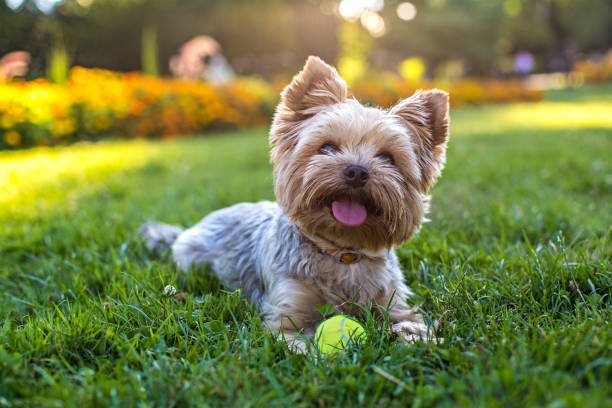
Exercise Plan for Yorkshire Terriers
Yorkshire Terriers are small dogs with bundles of energy. Here’s a comprehensive exercise plan to help them stay active and maintain a healthy lifestyle:
1. Daily Walks: Yorkshire Terriers benefit from daily walks, which provide mental stimulation and physical exercise. Aim for two short walks per day, each lasting around 15 to 20 minutes.
2. Playtime: Interactive playtime is crucial for Yorkies. Engage in games like fetch, tug-of-war, or hide-and-seek. These activities tap into their natural instincts and keep them mentally sharp.Play sessions should last about 15 to 20 minutes, multiple times a day.
3. Indoor Play: On days when the weather isn’t conducive to outdoor activities, create an indoor play area with toys and obstacles. Interactive toys that dispense treats or puzzles that challenge their minds are excellent choices.
4. Socialization: Arrange playdates with other small, friendly dogs or take your Yorkshire Terrier to a dog park designed for small breeds. Socialization helps them build positive relationships with other dogs.
5. Agility Training: Yorkshire Terriers are intelligent and agile, making them excellent candidates for agility training. Set up a mini agility course in your backyard or participate in organized classes for small dogs.
6. Mental Stimulation: In addition to physical exercise, mental stimulation is crucial. Use treat puzzles, obedience training, or scent games to keep their minds active.
7. Supervised Exploration: Allow your Yorkie to explore safe and secure outdoor spaces while supervised. This helps satisfy their curiosity and provides sensory stimulation.
8. Swimming: If your Yorkshire Terrier enjoys water, consider introducing them to swimming. It’s a low-impact exercise that can be both fun and beneficial for their joints. Always use a life vest designed for small dogs when introducing them to water.
9. Treadmill Exercise: Some owners opt for a dog treadmill for indoor exercise, especially during inclement weather. Ensure that your Yorkie is comfortable with the treadmill and use it under supervision.
10. Mental Games: Keep your Yorkie’s mind sharp by incorporating mental games like “find the treat” or “hide and seek.” These activities are mentally stimulating and can be done indoors.
Remember that Yorkshire Terriers are small and may have shorter stamina compared to larger breeds. Ensure that their exercise sessions are appropriate for their size and age. Always monitor them during play to prevent overexertion.
Nutrition and Feeding Guidelines
Proper nutrition is vital for your Yorkshire Terrier’s overall health and well-being. Here are specific dietary recommendations based on their size, age, and activity level:
1. High-Quality Dog Food: Choose a high-quality dog food that lists a quality protein source as the first ingredient. Look for options suitable for small breeds, as these typically have smaller kibble sizes.
2. Portion Control: Yorkshire Terriers are prone to obesity, so portion control is essential. Follow the recommended feeding guidelines on the dog food packaging, but adjust portions based on your dog’s age, activity level, and metabolism.
3. Frequent Meals: Due to their small stomachs, Yorkshire Terriers may benefit from multiple small meals throughout the day rather than one or two large meals. This can help prevent digestive issues.
4. Age-Appropriate Diet: Puppies, adult dogs, and seniors have different nutritional needs. Ensure you’re providing a diet that aligns with your Yorkshire Terrier’s age.
5. Fresh Water: Always provide access to clean, fresh water. Yorkshire Terriers are prone to dental issues, so hydration is crucial.
6. Dietary Restrictions: Some Yorkies may have specific dietary restrictions or allergies. If you suspect food-related issues, consult your veterinarian for guidance.
7. Treats: Limit the number of treats you offer and use them for training or as occasional rewards. Opt for small, low-calorie treats to avoid excessive calorie intake.
8. Avoid Human Food: Refrain from feeding your Yorkie human food, especially items that can be toxic to dogs like chocolate, grapes, and onions.
9. Regular Feeding Schedule: Establish a regular feeding schedule to help with housebreaking and maintain a routine. Feed at the same times each day.
10. Monitor Weight: Keep an eye on your Yorkie’s weight to ensure they stay in a healthy range. Consult your veterinarian if you have concerns about weight management.
It’s important to consult your veterinarian for personalized dietary recommendations based on your Yorkshire Terrier’s specific needs. They can help you create a balanced diet plan that supports their growth, energy requirements, and overall health.
In conclusion, a well-rounded exercise plan and proper nutrition are key to keeping your Yorkshire Terrier happy and healthy. Regular physical and mental activity, along with a balanced diet, will contribute to their overall well-being and ensure they lead a vibrant and fulfilling life. Remember to tailor their exercise and diet to their individual needs, and consult your vet for guidance on maintaining their health.
Socialization and Training Tips
Yorkshire Terriers, like all dogs, benefit from proper socialization and training to become well-adjusted and well-behaved companions. In this section, we will provide breed-specific training tips, considering their temperament and intelligence. Additionally, we’ll offer advice on how to socialize Yorkshire Terriers with other dogs and people effectively.

Training Tips for Yorkshire Terriers
Training a Yorkshire Terrier can be a rewarding experience, but it’s important to understand their unique traits and temperament. Here are some training tips tailored to Yorkies:
1. Consistency is Key: Be consistent with your training commands, rewards, and routines. Yorkshire Terriers thrive on predictability, so maintaining a consistent environment helps them learn more effectively.
2. Positive Reinforcement: Use positive reinforcement techniques such as praise, treats, and toys to reward good behavior. Yorkies respond well to positive feedback.
3. Short, Regular Sessions: Yorkies have a relatively short attention span, so keep training sessions short and frequent. Aim for 10 to 15-minute sessions a few times a day rather than one long session.
4. Start Early: Begin training and socialization early in your Yorkie’s life. Puppies are more receptive to learning and adapting to new experiences during their formative months.
5. Socialization: Expose your Yorkshire Terrier to various people, pets, and environments from an early age. This helps them develop into well-adjusted and confident dogs.
6. Leash Training: Yorkshire Terriers can be prone to pulling on the leash due to their energetic nature. Consistent leash training from an early age is essential for enjoyable walks.
7. Housetraining: Be patient and consistent when housetraining your Yorkie. Use positive reinforcement for successful potty trips outdoors, and establish a regular bathroom schedule.
8. Obedience Classes: Consider enrolling in obedience classes or working with a professional dog trainer, especially if you’re new to dog ownership. Professional guidance can be invaluable.
9. Be Firm but Gentle: Yorkies respond well to firm, gentle guidance. Avoid harsh training methods, as they can cause anxiety in these sensitive dogs.
10. Barking Control: Yorkshire Terriers have a reputation for being vocal. Use positive reinforcement to train them to control excessive barking and provide them with plenty of mental stimulation to reduce boredom-related barking.
Socialization Tips for Yorkshire Terriers
Socialization is crucial for Yorkshire Terriers to help them become confident and well-behaved around other dogs and people. Here’s how to effectively socialize your Yorkie:
1. Start Early: Begin socialization during the puppy stage. The earlier you expose your Yorkie to different experiences, the more adaptable they will become.
2. Controlled Exposures: Introduce your Yorkie to various people, including children and adults, in a controlled and positive environment. Gradually increase the complexity of social situations.
3. Puppy Playdates: Arrange playdates with other small, friendly dogs to help your Yorkie develop good social skills. Supervise these interactions to ensure safety.
4. Dog Parks: If you decide to take your Yorkie to a dog park, choose one that has a designated small dog area. Keep a close eye on your Yorkie to prevent any potential conflicts with larger dogs.
5. Positive Experiences: Make sure that every social interaction is a positive one. Use treats, praise, and toys to reward your Yorkie for calm and friendly behavior.
6. Exposure to Different Environments: Take your Yorkie to various places, such as parks, pet-friendly stores, and different neighborhoods. This helps them become comfortable in different surroundings.
7. Positive Handling: Gently handle your Yorkie’s paws, ears, and mouth regularly to accustom them to grooming and vet visits.
8. Controlled Introduction: If you have other pets at home, introduce your Yorkie to them gradually and under supervision. Ensure that interactions are calm and positive.
9. Continued Socialization: Socialization should be an ongoing process throughout your Yorkie’s life. Regular exposure to different people, pets, and experiences helps maintain their social skills.
Remember that every Yorkshire Terrier is an individual, and their socialization needs may vary. Pay attention to your dog’s comfort level and adjust your socialization efforts accordingly. Always prioritize their safety and well-being during social interactions.
Common Behavioral Traits
Yorkshire Terriers have distinct behavioral traits, both positive and challenging. Understanding these traits is essential for effective training and care. Here are some common behavioral traits associated with Yorkshire Terriers and advice on managing them:
Positive Behavioral Traits
1. Affectionate: Yorkies are known for their affectionate nature. They form strong bonds with their owners and enjoy being close to them. This affection makes them excellent companions.
2. Loyal: Yorkshire Terriers are loyal to their families and often have a protective instinct. They can be good watchdogs, alerting you to potential intruders.
3. Curious: Yorkies are curious by nature and enjoy exploring their surroundings. This curiosity can make walks and playtime engaging for both you and your dog.
4. Intelligent: Despite their small size, Yorkshire Terriers are intelligent dogs. They pick up commands quickly and enjoy learning new tricks.
5. Playful: Yorkies have a playful and lively demeanor, which can bring joy and entertainment to your household. They love interactive play and thrive on mental stimulation.
Challenging Behavioral Traits
1. Barking: Yorkshire Terriers are known for their vocal nature and can be prone to excessive barking. Training and positive reinforcement can help manage this behavior.
2. Stubbornness: Some Yorkies can exhibit stubbornness during training, so patience and consistency are essential. Avoid getting into power struggles with your dog.
3. Small Dog Syndrome: Due to their size, some Yorkshire Terriers may develop “Small Dog Syndrome,” where they believe they are in charge. Consistent training and clear boundaries can help prevent this issue.
4. Separation Anxiety: Yorkies can be prone to separation anxiety when left alone for extended periods. Gradual desensitization to departures and arrivals can help reduce anxiety.
5. Territorial Behavior: Yorkshire Terriers may exhibit territorial behavior, particularly in their own space. Early socialization and positive reinforcement can help mitigate this trait.
Managing and addressing challenging behavioral traits in Yorkshire Terriers requires patience, consistency, and positive reinforcement. Remember that each dog is unique, and understanding their individual personality is key to successful training and behavior modification.
In conclusion, Yorkshire Terriers are wonderful companions known for their affectionate and loyal nature. Effective training and socialization are essential for bringing out the best in this breed. Embrace their positive traits and address challenging behaviors with patience and love, and you’ll enjoy a fulfilling and loving relationship with your Yorkshire Terrier.
Personal Stories and Testimonials
One of the most valuable insights into what it’s like to own a Yorkshire Terrier comes from real-life experiences and the stories of dedicated owners. In this section, we’ll share personal stories and testimonials from Yorkshire Terrier owners, highlighting their experiences, challenges, joys, and the cost of owning this breed. Additionally, we’ll discuss the pros and cons of having a Yorkshire Terrier as a pet.
Testimonial 1: Sarah’s Story

Owner: Sarah L.
Location: New York, NY
Experience: 5 years
Cost of Ownership:
- Grooming: Approximately $500 annually for professional grooming services.
- Food and Treats: Approximately $400 per year for high-quality dog food and occasional treats.
- Vet Expenses: Around $300 annually for routine check-ups and vaccinations.
- Toys and Accessories: Approximately $100 per year.
- Total Annual Cost: Roughly $1,300.
Pros:
- “My Yorkshire Terrier, Max, has brought so much joy into my life. His affectionate nature and loyalty are unmatched. He’s the perfect size for apartment living, and his playful energy keeps me active.”
Cons:
- “Max can be quite vocal, which can be challenging in a city apartment. Additionally, their long, silky coats require regular grooming, which can add to the overall cost of ownership.”
Personal Experience:
- “Max is a bundle of energy and loves his daily walks and playtime in the park. His intelligence is impressive, and he’s learned a variety of tricks and commands. While grooming can be expensive, I’ve found a local groomer who does an excellent job, and Max enjoys the pampering.”
Testimonial 2: David’s Journey

Owner: David M.
Location: Los Angeles, CA
Experience: 10 years
Cost of Ownership:
- Grooming: Approximately $600 annually for professional grooming.
- Food and Treats: Around $500 per year for high-quality dog food and treats.
- Vet Expenses: Approximately $400 per year for routine check-ups and dental care.
- Toys and Accessories: Roughly $150 per year.
- Total Annual Cost: Approximately $1,650.
Pros:
- “My Yorkshire Terrier, Bella, has been a loyal companion for a decade. She’s easy to train, and her small size makes her a perfect travel companion. I’ve cherished the bond we’ve developed over the years.”
Cons:
- “Bella can be a bit stubborn at times, and her barking can be a challenge in our apartment building. The grooming expenses add up, but it’s a necessary investment to keep her coat healthy.”
Personal Experience:
- “Bella and I have shared many adventures together. She’s been with me through thick and thin, and I can’t imagine life without her. She’s also a hit with my friends and family, thanks to her friendly and sociable nature.”
Testimonial 3: Lisa’s Yorkshire Terrier Tales
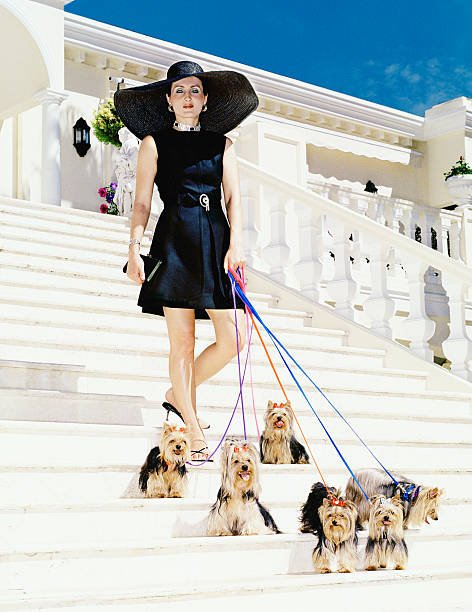
Owner: Lisa C.
Location: Chicago, IL
Experience: 7 years
Cost of Ownership:
- Grooming: Approximately $600 annually for professional grooming.
- Food and Treats: Around $450 per year for high-quality dog food and treats.
- Vet Expenses: Approximately $350 per year for routine check-ups and preventative care.
- Toys and Accessories: Roughly $100 per year.
- Total Annual Cost: Approximately $1,500.
Pros:
- “Owning a Yorkshire Terrier like Rocky has enriched my life in so many ways. He’s incredibly affectionate, and his small size makes him a lap dog extraordinaire. He’s always up for an adventure, whether it’s a walk in the park or a road trip.”
Cons:
- “Yorkshire Terriers can be a bit territorial, and Rocky is no exception. He’s a diligent watchdog, but sometimes his barking can be a bit much. I’ve had to work on his barking behavior.”
Personal Experience:
- “Rocky has been my loyal companion through life’s ups and downs. His playful antics and unwavering loyalty have made every day brighter. The grooming expenses are worth it to keep him looking and feeling his best.”
The Yorkshire Terrier Ownership Experience
The personal stories and testimonials of Yorkshire Terrier owners provide valuable insights into the joys and challenges of having this breed as a pet. While the cost of ownership, including grooming and care expenses, is a consideration, the love and companionship these dogs offer are immeasurable.
Prospective Yorkshire Terrier owners should be prepared for the breed’s vocal tendencies and invest in proper training and socialization to manage these traits effectively. The grooming requirements, while an added expense, are necessary to maintain the breed’s distinctive coat and overall health.
In conclusion, Yorkshire Terriers have a special place in the hearts of their owners. Their affectionate and loyal nature, combined with their manageable size, makes them cherished companions. By understanding their unique traits and investing in their care, Yorkshire Terrier owners can enjoy a fulfilling and loving relationship with these delightful dogs.
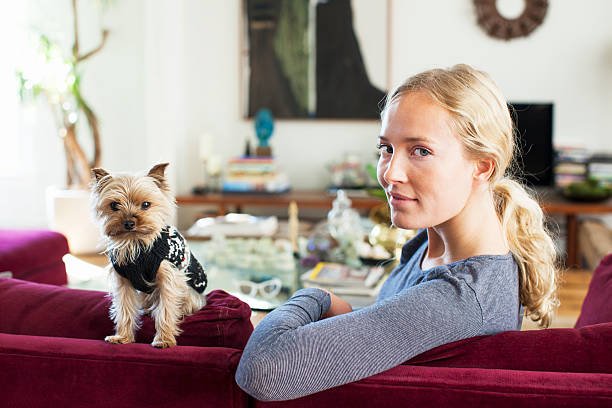
Breed-Specific Accessories and Care Products for Yorkshire Terriers
Ensuring the well-being and comfort of your Yorkshire Terrier involves choosing the right accessories and care products tailored to their specific needs. In this section, we’ll recommend a selection of accessories and care products that can enhance the life of your beloved Yorkshire Terrier. Whether you’re a new owner or looking to upgrade your current supplies, these recommendations cover grooming tools, harnesses, toys, and more.
1. Grooming Tools
Yorkshire Terriers are known for their luxurious, long coats that require regular grooming to keep them healthy and tangle-free. Here are some essential grooming tools for Yorkies:
1.1. Slicker Brush: A slicker brush with fine, wire bristles is perfect for removing tangles and preventing matting in your Yorkie’s coat. Look for one with rounded tips to avoid scratching their sensitive skin.
1.2. Stainless Steel Comb: A fine-toothed stainless steel comb is essential for fine-tuning your grooming sessions. It helps remove smaller tangles and provides a smooth finish.
1.3. Detangling Spray: Invest in a detangling spray to make brushing easier and more comfortable for your Yorkie. It can also add a pleasant scent to their coat.
1.4. Dog Shampoo and Conditioner: Opt for a high-quality, gentle dog shampoo and conditioner designed for long-haired breeds. Look for formulas that promote a healthy coat and skin.
1.5. Nail Clippers: Keep your Yorkie’s nails in check with a pair of dog-specific nail clippers. Regular nail trimming is essential for their comfort and mobility.
2. Harnesses and Leashes
Yorkshire Terriers may have delicate necks, so using a harness instead of a collar is a safer choice for walking and training. Here are some harness and leash options:
2.1. Step-In Harness: A step-in harness is easy to put on and comfortable for your Yorkie. Look for one with adjustable straps for a secure fit.
2.2. Vest Harness: A vest-style harness distributes pressure more evenly across the chest, reducing the risk of neck injuries.
2.3. Retractable Leash: If your Yorkie enjoys exploring during walks, a retractable leash can give them more freedom while maintaining control.
2.4. Reflective Harness and Leash: For evening walks, a harness and leash with reflective strips enhance visibility and safety.
3. Toys and Enrichment
Keeping your Yorkie mentally stimulated and physically active is crucial for their well-being. Here are some toys and enrichment options:
3.1. Interactive Puzzle Toys: Yorkies enjoy problem-solving. Interactive puzzle toys challenge their minds and keep them engaged.
3.2. Plush Toys: Soft, plush toys are comforting for Yorkies and provide a source of entertainment.
3.3. Squeaky Toys: Many Yorkies love toys that squeak. These can be a source of both fun and exercise.
3.4. Treat-Dispensing Toys: Treat-dispensing toys encourage your Yorkie to work for their treats, promoting mental stimulation.
3.5. Kong Classic Dog Toy: Fill a Kong toy with treats or peanut butter for hours of entertainment.
4. Grooming Table
If you plan to groom your Yorkshire Terrier at home, investing in a grooming table can make the process easier and more comfortable for both you and your dog. Look for a table with a non-slip surface and adjustable height to suit your needs.
5. Dog Stroller
Yorkshire Terriers may have short legs, and long walks can be tiring for them. A dog stroller is a convenient accessory for providing them with a comfortable ride while you explore parks or neighborhoods.
6. Travel Carrier
For trips to the vet or travel adventures, a sturdy travel carrier designed for small dogs is a must. Ensure it provides adequate ventilation and a secure closure.
7. Doggy Steps or Ramp
Yorkshire Terriers may struggle to jump on and off furniture or climb stairs due to their size. Doggy steps or a ramp can help them access their favorite spots safely.
8. Doggie Diapers
If your Yorkie is prone to accidents or incontinence, doggie diapers can be a helpful solution to keep your home clean.
9. Dog Dental Care Products
Maintaining your Yorkie’s dental health is essential. Invest in dog-specific toothbrushes, toothpaste, and dental chews to keep their teeth clean and their breath fresh.
10. Dog ID Tag
Ensure your Yorkie always wears an ID tag with your contact information. It’s a crucial safety measure if they ever get lost.
11. Dog Bed
Provide your Yorkie with a comfortable and supportive dog bed, especially if they have joint or mobility issues.
12. Cooling Mat
During hot weather, a cooling mat can help your Yorkie stay comfortable and prevent overheating.
13. Doggie Sunglasses (Doggy Goggles)
Protect your Yorkie’s eyes from the sun, wind, and debris during outdoor activities with a pair of doggie sunglasses.
14. Dog Raincoat
Keep your Yorkie dry and comfortable during rainy walks with a waterproof dog raincoat.
15. Doggie Sweaters
Yorkshire Terriers have fine, thin coats and may need extra warmth in cold weather. Doggie sweaters can help keep them cozy.
When choosing accessories and care products for your Yorkshire Terrier, consider their specific needs, size, and preferences. Regular grooming, proper training, and engaging toys are essential for their overall well-being. By providing the right tools and items, you’ll ensure a happy and healthy life for your cherished Yorkshire Terrier companion.
Frequently Asked Questions (FAQs) About Yorkshire Terriers
Yorkshire Terriers are adorable and spirited dogs, but potential owners often have questions about their care, characteristics, and suitability as pets. In this section, we’ll address ten common questions about Yorkshire Terriers, covering various aspects of this beloved breed.
1. How big do Yorkshire Terriers get?
Yorkshire Terriers are a small breed, typically weighing between 4 to 7 pounds (1.8 to 3.2 kilograms) and standing about 7 to 8 inches (18 to 20 centimeters) tall at the shoulder. Some may be slightly larger, but they remain one of the tiniest dog breeds.
2. Do Yorkshire Terriers shed?
Yorkshire Terriers have hair, not fur, which makes them a low-shedding breed. However, their long, silky coat requires regular grooming to prevent matting and tangling. Routine brushing and occasional trimming are essential to maintain their coat.
3. Are Yorkshire Terriers good with children?
Yorkshire Terriers can be good with children, but their small size makes them delicate. It’s crucial to teach children how to handle them gently and supervise interactions to prevent accidental injury. Proper socialization from a young age can help Yorkies get along well with kids.
4. Do Yorkshire Terriers get along with other pets?
Yorkshire Terriers can be compatible with other pets, including dogs and cats, when properly introduced and socialized. Early exposure to different animals and positive experiences can help them adapt to living in a multi-pet household.
5. Are Yorkshire Terriers easy to train?
Yes, Yorkshire Terriers are intelligent and can be trained effectively. However, they can also be a bit stubborn. Consistent, positive reinforcement training methods work best with this breed. Short, regular training sessions are more effective than long, repetitive ones.
6. How much exercise do Yorkshire Terriers need?
Despite their small size, Yorkshire Terriers are active dogs that need daily exercise and mental stimulation. Aim for about 30 minutes to an hour of exercise each day, which can include walks, playtime, and interactive toys.
7. Do Yorkshire Terriers bark a lot?
Yes, Yorkshire Terriers are known for their vocal nature. They can be prone to barking, especially if not properly trained and socialized. It’s essential to address barking behavior early to prevent excessive noise.
8. How long do Yorkshire Terriers live?
The average lifespan of a Yorkshire Terrier is around 12 to 15 years, but with proper care and attention to their health, some Yorkies can live even longer. Regular vet check-ups, a balanced diet, and a safe environment contribute to their longevity.
9. Are Yorkshire Terriers hypoallergenic?
While no dog breed is entirely hypoallergenic, Yorkshire Terriers are considered hypoallergenic because they produce fewer allergenic proteins than some other breeds. However, individual allergies can vary, so spending time with a Yorkie before bringing one home is recommended for allergy-prone individuals.
10. Are Yorkshire Terriers prone to any specific health issues?
Yes, like all breeds, Yorkshire Terriers have specific health concerns to be aware of, including:
- Luxating Patella: A condition where the kneecap dislocates, which can be hereditary in Yorkies.
- Dental Issues: Due to their small mouths, Yorkies are prone to dental problems, so regular dental care is crucial.
- Tracheal Collapse: Their delicate windpipes can be susceptible to collapse, so use a harness instead of a collar for walks.
- Portosystemic Shunt: Some Yorkies may have a liver condition known as a portosystemic shunt, which requires medical attention.
Regular veterinary check-ups and a well-balanced diet can help address and prevent these health concerns in Yorkshire Terriers.
These FAQs cover some of the most common questions about Yorkshire Terriers, but it’s essential to research and consider the breed’s unique needs and characteristics thoroughly before bringing one into your home. Yorkshire Terriers can make loving and loyal companions for individuals and families who understand and provide for their requirements.
Conclusion
In this comprehensive guide to Yorkshire Terriers, we’ve explored every facet of this beloved breed, from their distinctive characteristics to their specific care requirements. As you consider bringing a Yorkshire Terrier into your life, it’s essential to summarize the key points covered in this article, emphasize the significance of responsible ownership, and encourage the adoption of these delightful dogs.
Recap of Key Points
- Characteristics: Yorkshire Terriers are small dogs with long, silky coats, known for their lively and affectionate personalities. They are intelligent, loyal, and make excellent companions.
- Grooming: Yorkshire Terriers require regular grooming to maintain their coats, which should be brushed daily and trimmed as needed. They are a low-shedding breed but need attentive coat care.
- Temperament: Yorkies are known for their spirited nature. They can be excellent family pets, but early socialization and training are crucial to manage their vocal tendencies and assertive personalities.
- Health Considerations: Yorkshire Terriers can be prone to specific health issues, including dental problems, patellar luxation, and tracheal collapse. Regular veterinary check-ups and a balanced diet are essential for their well-being.
- Exercise Needs: Despite their small size, Yorkshire Terriers are active dogs that require daily exercise and mental stimulation. They enjoy walks, playtime, and interactive toys.
- Adoption: Consider adopting a Yorkshire Terrier from a rescue organization or shelter. Many loving dogs of this breed are in need of forever homes, offering you the opportunity to provide a second chance to a deserving dog.
Responsible Ownership Matters
As you embark on the journey of welcoming a Yorkshire Terrier into your home, remember that responsible ownership is paramount. This includes:
- Proper Care: Commit to providing your Yorkie with the care they need, including regular grooming, veterinary check-ups, a balanced diet, and a safe living environment.
- Training and Socialization: Invest time and effort in training and socializing your Yorkshire Terrier to ensure they are well-behaved and comfortable in various situations.
- Exercise and Stimulation: Meet their exercise needs and mental stimulation requirements to keep them happy and healthy.
- Regular Veterinary Care: Stay proactive about their health by scheduling regular check-ups and vaccinations with a trusted veterinarian.
- Respect Their Size: Due to their small size, handle them with care and supervise interactions with children and larger pets to prevent accidents.
Encourage Adoption
While Yorkshire Terriers are a popular breed, there are many in need of homes through adoption. Consider adoption as your first choice when looking for a Yorkshire Terrier. Rescue organizations and shelters often have Yorkies of all ages waiting for loving families. By adopting, you provide a loving home to a dog in need and contribute to the well-being of these wonderful animals.
For more information on adopting a Yorkshire Terrier, you can visit the websites of reputable rescue organizations and shelters in your area. Additionally, reach out to local breed-specific rescue groups that specialize in Yorkshire Terriers.
In conclusion, Yorkshire Terriers are enchanting companions, known for their lively personalities and affectionate nature. By embracing responsible ownership and considering adoption, you can create a fulfilling and loving relationship with a Yorkshire Terrier that will bring joy to your life for years to come.



















